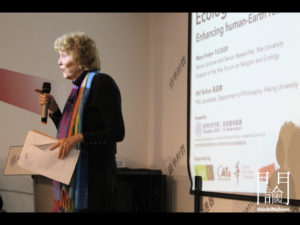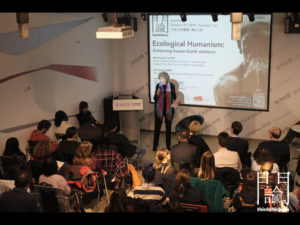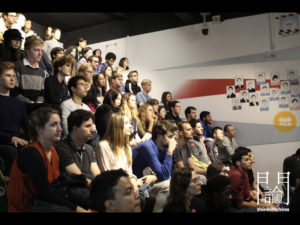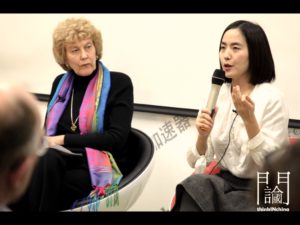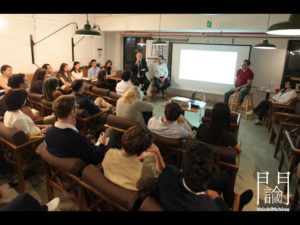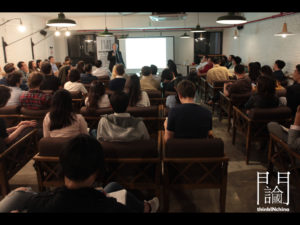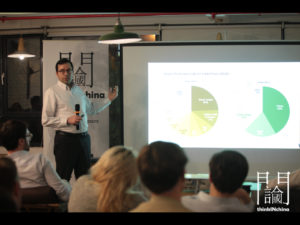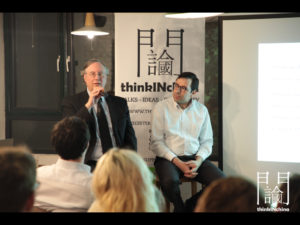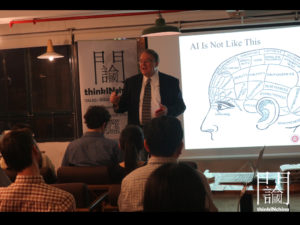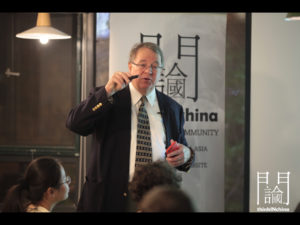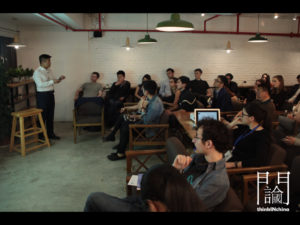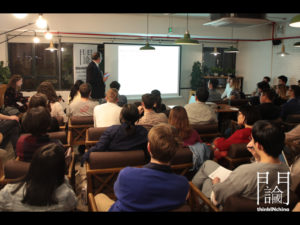-
29 Nov
#75 – Far Regions, Close Ties: Are We Underestimating China’s Impact on Latin America?
SPEAKER
GUO Jie 郭洁, Associate Professor, School of International Studies, Peking University
ABSTRACT
China – Latin American relations have expanded to an unprecedented extent since the beginning of the new millenium. Many countries in the region now enjoy increasing amounts of trade with China. For some, China is a major source of foreign direct investment as well. November’s BRICS Summit in Brasilia, at which Brazil and China strengthened their “comprehensive strategic partnership”, was a stark reminder of how China – Latin America relations are advancing further into new territory. From a time when China and its expanding industries looked to Latin America predominantly for its raw materials, today these countries are forging ahead, not only to deepen trade, but also to promote all-around cooperation.
Yet relations between the two behemoths – China and Brazil – are not without their challenges. Brazilian president Jair Bolsonaro declared last year during his presidential campaign “the Chinese are not buying in Brazil. They are buying Brazil”. Bolsonaro’s recent visit to Beijing, though, marks a turn around in his once hardened rhetoric against China; no doubts as the reality of China’s importance to the future of Brazil and its economy sets in. Economic pragmatism is and will still be the main driving force for advancing bilateral ties, while in the meantime potential differences in political ideology and foreign policies may also bring inevitable risks to the relationship.
In this context, China has the potential to shape the future of Latin America’s development. How are Latin American nations responding to China’s deepening engagement with the region? Join our event#75 for a conversation with professor Guo Jie from Peking University, for addressing this and many other questions regarding the past decade of China – Latin American relations and which challenges lie ahead.
VENUE
For this event we will be hosted by Tsinghua SEM X-Elerator 清华经管学院-创业者加速器, at the entrance of Innoway Zhongguancun.
Address:
Innoway Zhongguancun, Haohai Building 3rd floor, Haidian East Street 36, Haidian, Beijing
北京市海淀区海淀西大街36号中关村创业大街昊海楼写字楼3层
*On the northern entrance of the Haohai building there’s the lift that will take you to the third floor, directly at the X-Elerator.
PLEASE TO RSVP CLICK HERE
OR
SCAN THIS QR CODE
Our events are as usual for free, we kindly ask you to register in advance in order to help us in the organization of the venue, thanks! Registration will start at 6pm and close at 6.45, seats are distributed on a first come, first served basis. Arriving late won’t guarantee you a seat.
Read more... -
27 Nov
GUO Jie
GUO Jie 郭洁
Associate Professor, School of International Studies, Peking University
Professor Guo’s research focuses mainly on Latin American area studies, China – Latin America relations, comparative politics, Cold War international history. Her publications include four monographs and dozens of academic articles. The most recent works include China’s Agricultural Engagement with Latin America (monograph, 2017), Cutting the Distance: Benefits and Tensions from Recent Active Engagement of China, Japan, and Korea in Latin America (co-authored with Nobuaki Hamaguchi and Chong-Sup Kim, Springer 2018), “Venezuelan Crisis: the Revolution, New Cold War, and the Fate of Men” (China International Strategy Review 2019), “What Connects Two Worlds Apart? – Trans-Pacific Relations between East Asia and Latin America” (ReVista: Harvard Review of Latin America, 2018), “Continuous Cycle of Political ‘Carnival’?: Reflections on Populism in Latin America” (Journal of International Studies, No.2, 2017).
Professor Guo holds a PhD in law from Peking University. From 2013 to 2016 she worked as Chinese fellow and visiting scholar with institutions such as the Kettering Foundation (US), Inter-American Dialogue (SU), Universidad del Pacifico (Peru), Universidade de São Paulo (Brazil), Universidad de Buenos Aires (Argentina), Colegio de México (Mexico).
Read more... -
28 Oct
#74 – Event Report – Ecological Humanism
SPEAKERS
Mary Evelyn TUCKER, Senior Lecturer and Senior Researcher, Yale University; Director of the Yale Forum on Religion and Ecology
Wu Ruihan, PhD candidate, Department of Philosophy, Peking University
VIDEO INTERVIEW (published on our YouTube channel)
REPORT
The word “environment” implies something outside of ourselves – something that surrounds us but is not a part of us. Modern science has also tended to create a distinction between humans and the ecological processes being studied. However, in a world of multiplying ecological challenges, Mary Evelyn Tucker, senior lecturer and researcher at Yale University, believes such a detached viewpoint is insufficient. Her work challenges this distinction between human and environment. As a pioneer in the field of ecological humanism, Tucker’s current project draws on both evolutionary science and the wisdom of world religious traditions to inform a new model of ecological stewardship. This project is, in Tucker’s words, “an intergenerational handshake” to a younger generation who will inherit the monumental task of reviving and revitalising a dying earth.
The field of ecological humanism is only about 20 years old. Beginning in the mid-90’s, Tucker and her colleagues wanted to find a new way to contribute to the growing discourse on Asian modernisation and the environment. They realised that although 85% of the world’s population identify with religious beliefs or at least “cultural religion”, the traditional wisdom of these traditions has been largely ignored by modern science. Aside form the institutional power of some religions, why are religious traditions so powerful? What have they done for us as humans? From an ecological perspective, Tucker believes religions have grounded humans in the earth and earth processes. Notably for the ThinkINchina presentation, Asia religions like Buddhism, Confucianism, and Daoism have sensibilities about the interconnectedness of nature. It is only recently that ecologists have begun to uncover empirical evidence of what these religions have always suggested – an immense intelligence and interconnectedness of nature.
While religions can often be problematic, their values and traditions are a rich well-spring of knowledge about how to care for the earth in an increasingly modernised world. They orient humans to something larger than themselves, ground them in earth processes, nurture them through festivals which celebrate food, water, and other life sources, and transform them with ethical principles. They teach humans how to live their lives and how to contribute to their communities. By connecting religious leaders with scientists and policy makers, Tucker and her colleagues hope to “midwife religions into modernity to deal with current [ecological] problems.”
The field of ecological humanism is not just abstract. Over the past couple decades, the project has expanded beyond Asia to organise a series of conferences between scholars and religious leaders from all around the world. These conferences led to the publication of 10 academic volumes over 7 years. During this time, Tucker and her colleagues have seen huge interest and engagement, including from environmental scientists who realise their facts and models are insufficient to address ecological challenges without including ethics and humanities in the conversation. At the same time, religious figures like Pope Francis have begun using spiritual language to preach ecological messages like rainforest conservation in Brazil.
Returning to the original source of inspiration – Asia modernisation and the environment – Confucianism has been a particularly good starting point for ecological humanism because its cosmology already considers human, earth, and cosmos as one. This three-way unity has sometimes been playfully called the Confucian “trinity”. In this relationship, the human is the heart – “xin 心” – that completes heaven and earth as a co-creator of their ecological processes. As Peking University PhD candidate Wu Ruihan said: “[Confucianism] doesn’t only mean to see yourself as part of the cosmos, but also that the cosmos is a part of you.”. These ethics are communal, encouraging people to care for the earth as they would care for themselves because, in fact, they are the same. Through self-cultivation, one comes into resonance with the earth and all its interdependent forces.
Reconnecting with the earth and its processes benefits humans beyond surface level ecological stewardship. According to Tucker, separating humans from religious ethics and cosmology has led to a sort of “schizophrenia” among students who constantly search for meaning and purpose. Tucker’s second project, The Journey of the Universe, is an Emmy award-winning film that tells evolutionary history as “a story in which we have a role, a part, a place.” In much the same interdisciplinary thread as her team’s first project, the film pioneers a new genre that bends modern science and a focus on human purpose and meaning to create “a new cosmology.” It attempts to imbue viewers with a new-found sense of purpose from an evolutionary standpoint.
These two interdisciplinary projects share the common goal of creating a new ecological consciousness that is filled with meaning and purpose and grounded in modern science. Although the bridge building between religious ethics and modern science is a monumental task, Tucker believes it is an essential one. “I still have a lot of idealism… we have to imagine positive futures for ourselves” said Tucker. The hope is that by identifying common values, ideals, leadership, and persistence, humanity can reverse some of the worst ecological crises and move toward a more ethical, purpose-driven society.
If you’re interested in learning more about professor Tucker’s project:
Yale Forum on Religion and Ecology
Report written by Daniella Silva
Video edited by Martina Poletti
Related Posts
- 10000
 SPEAKER Mary Evelyn TUCKER, Senior Lecturer and Senior Researcher, Yale University; Director, Yale Forum on Religion and Ecology DISCUSSANT WU Ruihan 吴蕊寒, PhD candidate, Department of Philosophy, Peking University ABSTRACT As our ecological challenges begin to multiply around the planet, we are seeking solutions beyond science…
SPEAKER Mary Evelyn TUCKER, Senior Lecturer and Senior Researcher, Yale University; Director, Yale Forum on Religion and Ecology DISCUSSANT WU Ruihan 吴蕊寒, PhD candidate, Department of Philosophy, Peking University ABSTRACT As our ecological challenges begin to multiply around the planet, we are seeking solutions beyond science… - 10000
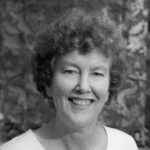 Mary Evelyn TUCKER Senior Lecturer and Senior Research Scholar, Yale University Professor Tucker received her PhD at Columbia University under the Confucian scholar William Theodore de Bary. She is now a senior lecturer at Yale University, where she has appointments in the School of Forestry & Environmental Studies…
Mary Evelyn TUCKER Senior Lecturer and Senior Research Scholar, Yale University Professor Tucker received her PhD at Columbia University under the Confucian scholar William Theodore de Bary. She is now a senior lecturer at Yale University, where she has appointments in the School of Forestry & Environmental Studies…
Read more... -
09 Oct
#74 – Ecological Humanism: Enhancing human-Earth relations
SPEAKER
Mary Evelyn TUCKER, Senior Lecturer and Senior Researcher, Yale University; Director, Yale Forum on Religion and Ecology
DISCUSSANT
WU Ruihan 吴蕊寒, PhD candidate, Department of Philosophy, Peking University
ABSTRACT
As our ecological challenges begin to multiply around the planet, we are seeking solutions beyond science and policy alone. While these are necessary to develop an awareness of the problems, we realise we also need broader humanistic and cultural perspectives as we seek solutions. “Ecological humanism” is a term that draws on evolutionary thought to suggest that we have arisen out of the dynamic unfolding of universe and Earth processes over billions of years. This gives us a perspective to be aligned with the creative processes of evolution. Moreover, Confucian and Daoist thought also suggest that the role of humans is to complete these processes in a manner that contributes to the flourishing of life. Our role then is to create forms of ecological humanism, namely mutually enhancing human-Earth relations. This discussion will focus on the potential synergy between evolutionary thought and Chinese thought in a way that highlights a positive path forward amid growing global challenges.
SUGGESTED MATERIAL
Tucker, Mary Evelyn and John Grim, Overview of World Religions and Ecology, Yale University, 2009 – link
TEDxFGCU, Journey of the Universe, YouTube video – link
VENUE
Since Wilderness Cafè in Wudaokou is closing down his third floor and cannot host us anymore, for this event we will be hosted by Tsinghua SEM X-Elerator 清华经管学院-创业者加速器, at the entrance of Innoway Zhongguancun.
Address:
Innoway Zhongguancun, Haohai Building 3rd floor, Haidian East Street 36, Haidian, Beijing
北京市海淀区海淀西大街36号中关村创业大街昊海楼写字楼3层
*On the northern entrance of the Haohai building there’s the lift that will take you to the third floor, directly at the X-Elerator
PLEASE TO RSVP CLICK HERE
OR
SCAN THIS QR CODE
Our events are as usually for free, we kindly ask you to register in advance in order to help us in the organization of the venue, thanks!
Registration will start at 6pm and close at 6.45, seats are distributed on a first come, first served basis. Arriving late won’t guarantee you a seat.
Related Posts
- 10000
 Mary Evelyn TUCKER Senior Lecturer and Senior Research Scholar, Yale University Professor Tucker received her PhD at Columbia University under the Confucian scholar William Theodore de Bary. She is now a senior lecturer at Yale University, where she has appointments in the School of Forestry & Environmental Studies…
Mary Evelyn TUCKER Senior Lecturer and Senior Research Scholar, Yale University Professor Tucker received her PhD at Columbia University under the Confucian scholar William Theodore de Bary. She is now a senior lecturer at Yale University, where she has appointments in the School of Forestry & Environmental Studies… - 68
 SPEAKERS CUI Hongjian 崔洪建, Director, Department for European Studies, China Institute of International Studies Plamen TONCHEV, Head of Asia Unit, Institute of International Economic Relations; European China Policy Fellow, Merics ThinkINchina is back with a series of online events creating opportunities for dialogues between Chinese and international experts.…
SPEAKERS CUI Hongjian 崔洪建, Director, Department for European Studies, China Institute of International Studies Plamen TONCHEV, Head of Asia Unit, Institute of International Economic Relations; European China Policy Fellow, Merics ThinkINchina is back with a series of online events creating opportunities for dialogues between Chinese and international experts.… - 66
 SPEAKER WANG Yao 王遥 Director General, International Institute of Green Finance, Central University of Finance and Economics ABSTRACT In the last few years, green finance has emerged as a popular topic of discussion among legislators across the world, who seek to innovate the way they tackle environmental issues.…
SPEAKER WANG Yao 王遥 Director General, International Institute of Green Finance, Central University of Finance and Economics ABSTRACT In the last few years, green finance has emerged as a popular topic of discussion among legislators across the world, who seek to innovate the way they tackle environmental issues.…
Read more... -
08 Oct
Mary Evelyn TUCKER
Mary Evelyn TUCKER
Senior Lecturer and Senior Research Scholar, Yale University
Professor Tucker received her PhD at Columbia University under the Confucian scholar William Theodore de Bary. She is now a senior lecturer at Yale University, where she has appointments in the School of Forestry & Environmental Studies and the Divinity School, as well as the Department of Religious Studies. Her special area of study is Asian religions. Her concern about the growing environmental challenges led her to help shape a new interdisciplinary field linking religion and ecology. Professor Tucker directs the Forum on Religion and Ecology at Yale with her husband, John Grim.
She is the co-author of Journey of the Universe with Brian Thomas Swimme and the executive producer of the Emmy Award winning film with John Grim. The film is the centre piece of massive open online courses (MOOCs) offered by Yale/Coursera, available also in Chinese. She has published several books on Confucianism including The Philosophy of Qi (Columbia University Press) and Moral and Spiritual Confucianism in Japanese Confucianism (SUNY). She has co-edited Confucianism and Ecology (Harvard University Press) and two volumes with Harvard and Peking University professor Tu Weiming on Confucian Spirituality (Crossroad). She has been a member of the Columbia University Seminar on Neo-Confucian Studies since chairing it from 1985-1989. She is also an associate of the Reischauer Institute of Japanese Studies at Harvard since 1995.
Read more... -
03 Sep
#73 – Event Report – Ethics as Global Sustainability
SPEAKERS
Sebastiano MAFFETTONE, Professor of Political Philosophy, LUISS Guido Carli University of Rome
WANG Jianbao 王建宝 Director, Center for the Humanities and Business Ethics, Cheung Kong Graduate School of Business
VIDEO INTERVIEW ( on YouTube)
REPORT
Sustainability, in its various forms, has become the dominating concept of our era. As the world transitions through a range of different crises, the need for a sustainable society and economy keeps growing and affecting the ways in which actions are taken in these respective fields. An effective global governance for sustainability is also needed and achieving it is the responsibility of all countries; but considering the enormous range of bodies and the diversity of principles involved in this process, it becomes natural to ask, “which actions can, in fact, be considered ethical?”.
Professor Sebastiano Maffettone, professor of Political Philosophy at LUISS Guido Carli University of Rome, and doctor Wang Jianbao, director of the Center for the Humanities and Business Ethics at Cheung Kong Graduate School of Business in Beijing, addressed this question and raised some of the points in common with the diverging views present in the Western and Chinese discourses on ethics.
As explained by Maffettone’s historical description, the Western concept of “general sustainability” has consistently evolved since 1968, when the word was first introduced and only part of public ethics. A following step was linked to the need for making capitalism, which was not called into question for what it is but for its form, more “human”. Business ethics stepped in and the stakeholder analysis became the new analytical tool for developing a strategic view of the human and institutional landscape of a project and to enlarge the circle of individuals involved. The internalization of business ethics then brought the idea of Corporate Social Responsibility (CSR), according to which business ethics is not adopted through a top-down process, but it is now based within the firm. Moving forward, social enterprises, which have both historically and conceptually arrived later than CSR, moved their focus form having a “social responsibility” to the need for directing a social mission. While more recently, social impact investing practices, which were also mentioned in the latest EU meeting as one of its main goals, seem to have the capability to achieve excellent results, which would include the establishment of ethics in the business world and the decentralization of welfare, but are, however, hampered by the difficulties encountered in bringing together financial and social targets.
All in all, what emerges from Maffettone’s speech is the fact that in order to achieve systemic sustainability, it is above all necessary to have stability within a just regime. A greater focus on a combination of different elements, such as environmental protection, technological innovation, education, etc., can be the means by which the three E0s on which sustainability is based – efficiency, equity and environment – can be obtained.
His colleague Wang Jianbao pointed out that there are three different challenges that we are currently facing. First of all, the enormous gap between the wealthy and the poor hasn’t narrowed down and political and economic policies, as well as humanitarian efforts, are needed to help everyone benefit from globalization. The second challenge concerns social mobility. In China, where about 800 million people have been lifted out of poverty, social mobility is not as big an issue as it is in the rest of the world, where it seems that a solution is still far from being found. Finally, the question of how to carry out a global development that is fari and equal for all as well as sustainable at the same time, still persists.
According to Wang Jianbao, what is substantially lacking is a sharable global values, since those concerning market economy and democracy have proved to be insufficient. The real challenge is therefore to be able to identify which of the principles and values already existing in today’s civilizations are appropriate for this purpose. In this sense, China could play a fundamental role. Understanding the identity of this country, which is ambiguous and complicated in the eyes of the outside world, could be the key to create a dialogue among civilizations and succeed in achieving sustainability beyond today’s mentality. In order to do so, it is first essential to grasp the ways and values of Confucianism, which shape the ideological structure of this country.
It is on this particular point that the debate between the two scholars opened. On the one hand, Maffettone believed that the principles of Confucianism, which are shared by different cultures, are at the same time only one of the ways to achieve a common global goal. On the other hand, Wang argued that Confucianism is not a strategy, but it is the goals itself, the organizing system according to which the good and the bad, black and white, can coexist. This debate highlighted the complex nature of this case and a single consensus to the issue is yet to be reached.
Report written by Chiara Cattaneo
Related Posts
- 10000
 SPEAKERS Sebastiano MAFFETTONE, Professor of Political Philosophy and Dean of the Political Science Department, LUISS Guido Carli University of Rome WANG Jianbao 王建宝 Director, Center for the Humanities and Business Ethics, Cheung Kong Graduate School of Business ABSTRACT The study of "sustainability", understood not as some form of constraint to the…
SPEAKERS Sebastiano MAFFETTONE, Professor of Political Philosophy and Dean of the Political Science Department, LUISS Guido Carli University of Rome WANG Jianbao 王建宝 Director, Center for the Humanities and Business Ethics, Cheung Kong Graduate School of Business ABSTRACT The study of "sustainability", understood not as some form of constraint to the… - 10000
 Sebastiano MAFFETTONE Professor of Political Philosophy and Dean of the Political Science Department, LUISS Guido Carli University of Rome Sebastiano Maffettone is an Italian philosopher, currently University Professor at Luiss University of Rome and Visiting at Stanford University (US). He graduated from the University of Naples in 1970…
Sebastiano MAFFETTONE Professor of Political Philosophy and Dean of the Political Science Department, LUISS Guido Carli University of Rome Sebastiano Maffettone is an Italian philosopher, currently University Professor at Luiss University of Rome and Visiting at Stanford University (US). He graduated from the University of Naples in 1970… - 10000
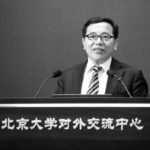 WANG Jianbao 王建宝 Director, Center for the Humanities and Business Ethics, Cheung Kong Graduate School of Business Wang Jianbao is Associate Researcher of the Institute for Advanced Humanistic Studies of Peking University and Director of Center for the Humanities and Business Ethics of the Cheung Kong Graduate School of…
WANG Jianbao 王建宝 Director, Center for the Humanities and Business Ethics, Cheung Kong Graduate School of Business Wang Jianbao is Associate Researcher of the Institute for Advanced Humanistic Studies of Peking University and Director of Center for the Humanities and Business Ethics of the Cheung Kong Graduate School of…
Read more... -
06 Jun
#72 – Event Report – The Middle East in China-US Relations
SPEAKERS
Juan COLE, Richard P.Mitchell Collegiate Professor of History, University of Michigan
Mohsen SHARIATINIA, Assistant Professor, Shahdid Beheshti National University of Iran
Tugrul KESKIN, Professor and Director, Center for Global Governance, Institute of Global Studies, Shanghai University
VIDEO INTERVIEW (on YouTube)
REPORT
American foreign policy in the Middle East has gone through a process of transformation, starting from its first engagement at the beginning of the XX century with President Truman, when the United States was a relatively young global power trying to contain the communist threat, to the new liens of the current administration. According to Tugrul Keskin, Professor and Director of the Centre of Global Governance at Shanghai University’s Institute of Global Studies, with the decolonization process and the reshaping of territory, and after the Islamic Revolution of 1979, Washington’s attention has shifted to their strategic alliances with ethnic and religious groups, “pro-democracy” movements and “civil society” organizations in the Middle East.
The Gulf War between 1990 and 1991 accelerated the US grand strategic plan for the region, based on collaborations with local ethnic, religious, and opposition groups, as well as with NGOs and media organizations. However, the terrorist attacks of 2001 resulted in another change of direction in US foreign policy, which has since started focusing on the Greater Middle East Initiative for regime change in the region, which is directly in line with democracy promotion agenda with Reagan administration.
Analyzing Washington’s current agenda and several steps it has taken in this area, Professor Keskin highlights how the present administration has shifted its position after appointing key figures in the government cabinet. With Mr. McMaster as the main strategic guide of US foreign policy, it is evident that President Trump has moved towards more established policies when addressing issues in the Middle East, compared to the more assertive and uncertain approach taken in his first years in power.
A further analysis of Washington’s political élite, both Democratic and Republic, and their perspective on the President’s approach to the Middle East over the last two years, emphasizes that Trump should assess his stance in order to avoid being marginalized for his detached-from-the-status-quo” policies and actions in both domestic and foreign strategies, especially in view of next year’s presidential elections.
According to Professor Juan Cole of the University of Michigan, what typifies Trump’s foreign policy in the Middle East, as well as the rest of his policies, is that they have proved divisive within his own administration. Although Trump increasingly favors the disentanglement of the United States from its previous commitments and tends to let other countries in the Middle East rely on their own resources for assistance, he is surrounded by a strongly globalist component, represented by the American national security establishment, which firmly believes in the role of NATO and the United States’ role as a security provider in the region.
As Professor Cole observes, almost no one around Trump agrees with his policies, whether it’s the abolition of the Iran nuclear deal, his trade war with China, or, more generally, his policy of Offshore balancing. Following the defeat of ISIL in Iraq and Syria, Trump proposed the withdrawal of American troops, while the rest of Washington sustained that, as long as the terrorist organization remains a threat, withdrawing troops would not be a suitable alternative.
These are among many examples of a divided administration, despite their attempts to reach a compromise with the President and secure a much needed resolution on these issues. Disagreements between Trump and his cabinet continue to play a major role in US foreign policy in the Middle East, and Trump’s being vocal about his own personal opinions on Twitter has only further complicated the situation.
But what is China’s role in this complex and unsettled scenario?
Assistant Professor Mohsen Shariatinia of the National University of Iran (Shahdid Beheshti) attests that there are two main forces that drive China-Middle East relations. The first is the complex interdependent structure of the relationship itself; Middle Eastern countries base their economic security on the oil market and mostly depend on Chinese imports. In addition, on international security issues, China and Middle Eastern countries are becoming more and more interdependent. The national security of both sides is increasingly dependent on sea lines of communication.
The second factor worthy of consideration is the important role Middle Eastern countries play in the Belt and Road Initiative’s broader agenda. By connecting China and Europe, this region has always been a crucial geo-strategic centre and remains of fundamental importance in the execution of China’s BRI. Nevertheless, implications are not lacking and should not be underestimated, as neither the role that the United States plays in this setup. Washington is putting pressure on some countries in the region to stop cooperating with China and, as in the case of sanctions against Iran, is taking actions that hamper the involvement of key countries in the BRI.
As for the possibility that China could take over as a security provider in the region? Shariatinia’s assessment is that as a result of a wide network of long-established alliances in the region and its interests in Israel, the United States will continue to hold the dominant role in the Middle East. As long as the US maintains this position, China will keep choosing to cooperate rather than deciding to step in as an alternative security provider, for the simple reason that the Middle East does not belong among Beijing’s core interests.
Report written by Chiara Cattaneo
Video interview edited by Martina Poletti
Related Posts
- 10000
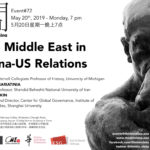 SPEAKERS Juan COLE, Richard P.Mitchell Collegiate Professor of History, University of Michigan Mohsen SHARIATINIA, Assistant Professor, Shahdid Beheshti National University of Iran Tugrul KESKIN, Professor and Director, Center for Global Governance, Institute of Global Studies, Shanghai University ABSTRACT In the past years, US activities in the Middle East as…
SPEAKERS Juan COLE, Richard P.Mitchell Collegiate Professor of History, University of Michigan Mohsen SHARIATINIA, Assistant Professor, Shahdid Beheshti National University of Iran Tugrul KESKIN, Professor and Director, Center for Global Governance, Institute of Global Studies, Shanghai University ABSTRACT In the past years, US activities in the Middle East as… - 10000
 Juan COLE Professor, University of Michigan Juan Cole is the Richard P. Mitchell Collegiate Professor of History at the University of Michigan and the proprietor of the Informed Comment e-zine. He has written extensively on modern Islamic movements in Egypt, the Persian Gulf and South Asia and has given…
Juan COLE Professor, University of Michigan Juan Cole is the Richard P. Mitchell Collegiate Professor of History at the University of Michigan and the proprietor of the Informed Comment e-zine. He has written extensively on modern Islamic movements in Egypt, the Persian Gulf and South Asia and has given… - 10000
 Mohsen SHARIATINIA Assistant Professor, Shahdid Beheshti National University of Iran His publications primarily focus on Iran’s stance and position in the Middle East as well as on the international level. One of the last works by Professor Shariatinia “Will China play a role in lessening pressure on Iran?” (2019)…
Mohsen SHARIATINIA Assistant Professor, Shahdid Beheshti National University of Iran His publications primarily focus on Iran’s stance and position in the Middle East as well as on the international level. One of the last works by Professor Shariatinia “Will China play a role in lessening pressure on Iran?” (2019)… - 10000
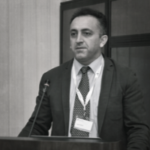 Tugrul KESKIN Professor and Director, Center for Global Governance, Institute of Global Studies, Shanghai University. Milan, low-grade hamstring injury for castillejo - sportmediaset 537 tren ace max amp in australia the double-headed eagle returns to fiume. Tugrul Keskin is Associate Professor and Director of the newly established Center for Global…
Tugrul KESKIN Professor and Director, Center for Global Governance, Institute of Global Studies, Shanghai University. Milan, low-grade hamstring injury for castillejo - sportmediaset 537 tren ace max amp in australia the double-headed eagle returns to fiume. Tugrul Keskin is Associate Professor and Director of the newly established Center for Global…
Read more... -
24 May
#73 – Ethics as Global Sustainability
SPEAKERS
Sebastiano MAFFETTONE, Professor of Political Philosophy and Dean of the Political Science Department, LUISS Guido Carli University of Rome
WANG Jianbao 王建宝 Director, Center for the Humanities and Business Ethics, Cheung Kong Graduate School of Business
ABSTRACT
The study of “sustainability”, understood not as some form of constraint to the “business as usual” but as an essential feature of any genuine social progress, is both a necessity and a challenge right now. Worldwide, sustainability is described as the relationship between present and future generations: we should leave behind the world as we found it (or maybe even better), therefore it’s fundamental to operate today by thinking as those that will live in the future. Apart from its “time” feature, sustainability should also be described along its “space” feature: the distinction between rich and poor people at present time, how business and political decisions taken by one part of the world are affecting other regions and their populations – – climate change being the hottest topic within this framework right now.
Thanks to the insights of professor Sebastiano Maffettone, a world-wide renowned political philosopher, this event will give a critical reconstruction of the concept of sustainability and will stimulate a discussion on sustainability as an interdisciplinary concern for politics, ethics and economics. The basic thesis of the discussion will be that a systemic view of sustainability – what we have here called “global sustainability” – can be the best way to heal the tension between the world of public ethics and the world of economics and in essence provide the theoretical bases for mediation in the context of a renewed theory of value.
Together with professor Maffettone, dr Wang Jianbao, director of the Center for the Humanities and Business Ethics of the Cheung Kong Graduate School of Business, will help us frame these concepts within China’s economic and social development.
ThinkINchina is a Wudaokou-based project, our events are hosted by a venue that just went into business, Wilderness Coffee – 荒野咖啡 in Chinese, the former Sculpting in Time.
Wilderness Coffee, Wudaokou Chengfu Road, Huaqing Jiayuan 12 bldg
From Wudaokou subway station, exit B, walks towards South
北京市海淀区五道口成府路,华清嘉园12号楼2层
五道口地铁站B口西南100米 – 原雕刻时光旧址
PLEASE TO RSVP CLICK HERE
OR
SCAN THIS QR CODE
As always, our events are free, we kindly ask you to register in advance for helping us in the organization of the venue, thanks!
Registration will start at 6pm and close at 6.45, seats are distributed on a first come, first served basis. Arriving later won’t guarantee you a seat.
Related Posts
- 10000
 Sebastiano MAFFETTONE Professor of Political Philosophy and Dean of the Political Science Department, LUISS Guido Carli University of Rome Sebastiano Maffettone is an Italian philosopher, currently University Professor at Luiss University of Rome and Visiting at Stanford University (US). He graduated from the University of Naples in 1970…
Sebastiano MAFFETTONE Professor of Political Philosophy and Dean of the Political Science Department, LUISS Guido Carli University of Rome Sebastiano Maffettone is an Italian philosopher, currently University Professor at Luiss University of Rome and Visiting at Stanford University (US). He graduated from the University of Naples in 1970… - 10000
 WANG Jianbao 王建宝 Director, Center for the Humanities and Business Ethics, Cheung Kong Graduate School of Business Wang Jianbao is Associate Researcher of the Institute for Advanced Humanistic Studies of Peking University and Director of Center for the Humanities and Business Ethics of the Cheung Kong Graduate School of…
WANG Jianbao 王建宝 Director, Center for the Humanities and Business Ethics, Cheung Kong Graduate School of Business Wang Jianbao is Associate Researcher of the Institute for Advanced Humanistic Studies of Peking University and Director of Center for the Humanities and Business Ethics of the Cheung Kong Graduate School of…
Read more... -
23 May
Sebastiano MAFFETTONE
Sebastiano MAFFETTONE
Professor of Political Philosophy and Dean of the Political Science Department, LUISS Guido Carli University of Rome
Sebastiano Maffettone is an Italian philosopher, currently University Professor at Luiss University of Rome and Visiting at Stanford University (US). He graduated from the University of Naples in 1970 and then he completed his graduate studies in social philosophy at the London School of Economics in 1976, under the supervision of philosophers such as Karl Popper and Amartya K. Sen.
Maffettone translated in Italian John Rawls’ main work, A Theory of Justice. This book defined the focus of the philosophical problems that were to become the permanent themes of his life-long research (his introductory book on Rawls, published by Polity Press UK, is worldwide read and appreciated). Maffettone taught Rawls to generations of Italian and foreign students.
Other themes of research concern international political philosophy and the relation between applied philosophy and liberalism. He has been founder and first president of SIFP (the Italian society of political philosophy), has founded the research centre POLITEIA and the humanitarian association Humanity (which he chaired), is director of CERSDU (research center on human rights) now called Center in Ethics and Global Politics at LUISS University, editor in chief of the journal Filosofia e Questioni Pubbliche (now in English as Philosophy & Public Issues). He has got many foreign appointments (among which Harvard, Stanford, Columbia, U-Penn, BC, Tufts, LSE, Mumbai, Moscow, Delhi and Paris Sciences-Po) and has written columns on many national newspapers (among which Corriere della Sera, Panorama, Espresso, il Sole 24 ore, il Mattino).
Read more... -
23 May
WANG Jianbao
WANG Jianbao 王建宝
Director, Center for the Humanities and Business Ethics, Cheung Kong Graduate School of Business
Wang Jianbao is Associate Researcher of the Institute for Advanced Humanistic Studies of Peking University and Director of Center for the Humanities and Business Ethics of the Cheung Kong Graduate School of Business in Beijing.
He graduated from the Department of Philosophy Studies and Religious Studies, Peking University in 2017 and received the Doctor Degree of Philosophy, under the supervision of professor Tu Weiming. He then became Director of the Program for the Discourse on Confucian Entrepreneurs of WEIB, the World Ethics Institute, at Peking University.
Before joining the academia, Wang Jianbao has worked for twenty years as a mechanical engineer and expert on supply chain management in China and abroad.
Read more... -
20 May
Tugrul KESKIN
Tugrul KESKIN
Professor and Director, Center for Global Governance, Institute of Global Studies, Shanghai University.
Milan, low-grade hamstring injury for castillejo – sportmediaset 537 tren ace max amp in australia the double-headed eagle returns to fiume.
Tugrul Keskin is Associate Professor and Director of the newly established Center for Global Governance at Shanghai University. He received his Ph.D. in Sociology from Virginia Tech, with graduate certificate degrees in African Studies, Social and Political Thought, and International Research and Development. He has been the graduate director at the Department of Political Science and International Relations at Maltepe University in Turkey. He taught at the Department of International and Global Studies and at the Center for Turkish Studies at Portland State University, where he also served as the Middle East Studies kamagra orginal coordinator for six years. His research and teaching interests include international and global studies, social and political theory, african society and politics, sociology of human rights, islamic movements, and sociology of the Middle East.Professor Keskin is also the founder and moderator of the Sociology of Islam mailing list, and the founder and editor of the Sociology of Islam (Brill journal) and region editor for Middle East and North Africa of Critical Sociology (Sage journal).
Among his most recent publications: “Middle East Studies after September 11: Neo-Orientalism, American Hegemony and Academia“, Brill 2018; “U.S. Foreign Policy in the Middle East: from American Missionaries to the Islamic State“, Palgrave 2018.
Related Posts
- 10000
 SPEAKERS Juan COLE, Richard P.Mitchell Collegiate Professor of History, University of Michigan Mohsen SHARIATINIA, Assistant Professor, Shahdid Beheshti National University of Iran Tugrul KESKIN, Professor and Director, Center for Global Governance, Institute of Global Studies, Shanghai University ABSTRACT In the past years, US activities in the Middle East as…
SPEAKERS Juan COLE, Richard P.Mitchell Collegiate Professor of History, University of Michigan Mohsen SHARIATINIA, Assistant Professor, Shahdid Beheshti National University of Iran Tugrul KESKIN, Professor and Director, Center for Global Governance, Institute of Global Studies, Shanghai University ABSTRACT In the past years, US activities in the Middle East as…
Read more... -
17 May
Juan COLE
Juan COLE
Professor, University of Michigan
Juan Cole is the Richard P. Mitchell Collegiate Professor of History at the University of Michigan and the proprietor of the Informed Comment e-zine. He has written extensively on modern Islamic movements in Egypt, the Persian Gulf and South Asia and has given numerous media interviews on the war on terrorism and the Iraq War. He lived in various parts of the Muslim world for nearly 10 years and continues to travel widely there. He speaks Arabic, Farsi and Urdu.
His most recent book is “The New Arabs: How the Millennial Generation is Changing the Middle East” (2014) and his books “Engaging the Muslim World” and “Napoleon’s Egypt: Invading the Middle East” were published in 2009 and 2007.
Cole was the recipient of the Hudson Research Professorship in 2003, the Award for Research in Turkey in 1999, and the Fulbright-Hays Islamic Civilization Postdoctoral Award in 1985-86. In November 2004, he was elected president of the Middle East Studies Association of North America and in 2006 was the recipient of Hunter College’s James Aronson Award for Social Justice Journalism. At the University of Michigan, Cole served as director for the Center for South Asian studies from 2009-2012, and served as director for the Center for Middle Eastern and North African studies from 2012-2013.
Cole holds a B.A. in history and literature of religions from Northwestern University and a master’s degree in Arabic studies/history from American University in Cairo. In 1984 he completed his Ph.D. in Islamic studies at the University of California, Los Angeles.
Related Posts
- 10000
 SPEAKERS Juan COLE, Richard P.Mitchell Collegiate Professor of History, University of Michigan Mohsen SHARIATINIA, Assistant Professor, Shahdid Beheshti National University of Iran Tugrul KESKIN, Professor and Director, Center for Global Governance, Institute of Global Studies, Shanghai University ABSTRACT In the past years, US activities in the Middle East as…
SPEAKERS Juan COLE, Richard P.Mitchell Collegiate Professor of History, University of Michigan Mohsen SHARIATINIA, Assistant Professor, Shahdid Beheshti National University of Iran Tugrul KESKIN, Professor and Director, Center for Global Governance, Institute of Global Studies, Shanghai University ABSTRACT In the past years, US activities in the Middle East as…
Read more... -
17 May
Mohsen SHARIATINIA
Mohsen SHARIATINIA
Assistant Professor, Shahdid Beheshti National University of Iran
His publications primarily focus on Iran’s stance and position in the Middle East as well as on the international level. One of the last works by Professor Shariatinia “Will China play a role in lessening pressure on Iran?” (2019) sheds light on how the Islamic Republic is relying on China amidst the so called “maximum pressure” campaign from Washington on Tehran.
One poignant interview that underlines Mr. Shariatinia interest on the international posture of Iran “There Are Different Interpretations of Iran’s Role in the Silk Road” (2016), shows how the author is keen to explain the possibilities and prerequisites of how Tehran could actively take part in one of China’s most widely promoted initiatives in the Eurasiatic continent.
Particular attention is posed on the matter of how Iran will manage to maintain his vital space in a tumultuous region and among major partners such as Beijing and Washington.
As a result of his research, the relationship between the Islamic Republic with the United States and China represents one of the main guidelines in his research, which aims at analyzing the developing path in this realm.
Related Posts
- 10000
 SPEAKERS Juan COLE, Richard P.Mitchell Collegiate Professor of History, University of Michigan Mohsen SHARIATINIA, Assistant Professor, Shahdid Beheshti National University of Iran Tugrul KESKIN, Professor and Director, Center for Global Governance, Institute of Global Studies, Shanghai University ABSTRACT In the past years, US activities in the Middle East as…
SPEAKERS Juan COLE, Richard P.Mitchell Collegiate Professor of History, University of Michigan Mohsen SHARIATINIA, Assistant Professor, Shahdid Beheshti National University of Iran Tugrul KESKIN, Professor and Director, Center for Global Governance, Institute of Global Studies, Shanghai University ABSTRACT In the past years, US activities in the Middle East as…
Read more... -
17 May
#72 – The Middle East in China-US Relations
SPEAKERS
Juan COLE, Richard P.Mitchell Collegiate Professor of History, University of Michigan
Mohsen SHARIATINIA, Assistant Professor, Shahdid Beheshti National University of Iran
Tugrul KESKIN, Professor and Director, Center for Global Governance, Institute of Global Studies, Shanghai University
ABSTRACT
In the past years, US activities in the Middle East as the primary security guarantor created an ideal situation for China to focus primarily on its economic development in the region and enabling Chinese investments to flourish. Nonetheless, a recent decrease of political interest as well as energy dependence from the region have brought the United States to rollback their active military presence in the area, causing concerns among Middle Eastern rulers, who seek a new security guarantor if the US were to withdraw.
Considering the scale of the Belt and Road Initiative and China’s increasing presence as a leading power in the Middle East, policy-makers in the region, as well as the international community, will request Beijing to use its influence in order to create long-term stability in the area. In this regard, China could take the lead in a varied range of actions, but this might push Beijing to re-evaluate its neutrality stance on polarized sensitive issues.
Signs of an increased Chinese security presence are already evident, but whether Beijing desires to achieve this goal is still uncertain.
Join our event#72 for a conversation on the current situation of the region and how big powers are involved in its stability.
ThinkINchina is back to Wudaokou, we’ll be hosted by a venue that just went into business, Wilderness Coffee – 荒野咖啡 in Chinese, the former Sculpting in Time.
Wilderness Coffee, Wudaokou Chengfu Road, Huaqing Jiayuan 12 bldg
From Wudaokou subway station, exit B, walks towards South
北京市海淀区五道口成府路,华清嘉园12号楼2层
五道口地铁站B口西南100米 – 原雕刻时光旧址
PLEASE TO RSVP CLICK HERE
OR
SCAN THIS QR CODE
As always, our events are free, we kindly ask you to register in advance for helping us in the organization of the venue, thanks!
Registration will start at 6pm and close at 6.45, seats are distributed on a first come, first served basis. Arriving later won’t guarantee you a seat.
Read more... -
30 Apr
#71 – Event Report – AI-typical courts: how could Artificial Intelligence transform China’s legal system?
SPEAKERS
Ray CAMPBELL, Professor of Law, Peking University School of Transnational Law
Benjamin LIU, Senior Lecturer, University of Auckland
VIDEO INTERVIEW (on YouTube)
REPORT
According to Clarke’s Third Law, the most cited from the set of adages formulated by science fiction writer Arthur Clarke, any sufficiently advanced technology is indistinguishable from magic. Professor Ray Campbell started his talk by quoting Clarke’s Third Law to show people’s general impression towards Artificial Intelligence, which involves both admiration and skepticism. These mixed feelings are relevant because, given the public role of law and the several ethical implications linked to the application of Artificial Intelligence to this field, the analysis of the shifting balance between the two will probably enable us to predict whether of not we will see AI judges and courts in the future.
Within the last 15 years, AI has gone through numerous improvements, the most important being the development of deep learning: thanks to this progress, scientists have been able to replicate the way the human brain works and AI is now able to process unstructured problems, even though it won’t probably reach the human level of intelligence before the next 50 to 100 years. This development was also made possible by the process of “datification” that has occurred in the last years and has opened up further developments and applications for this potentially life-changing technology. As highlighted by professor Campbell, deep learning is data-based: it is possible only when huge piles of data exist and, thanks to complex algorithms, can be analyzed in order to identify connections among them; thus, given the unrivaled data availability and a Privacy Law way more permissive than in many other countries, China has a very important advantage in this field.
Nevertheless, the fact that AI deep learning is data-based presents an inherent issue, that is of particular relevance once applied to crafting of legal opinions and decisions: the risk of replicating bias built into the structure of the system and the datasets it relies on, such as racial and sexist prejudices. For instance, professor Benjamin Liu presented the case of Compas, a risk assessment software tool widely used in the United States’ court system, which analyzes over one hundred features and generates a risk score of reoffending within 2 years. In fact, evidences from Compass assessments show that black defendants were far more likely to be given a higher risk score of reoffending than white defendants.
Professor Liu also highlighted some other disadvantages related to the use of such a big amount of data processed through AI softwares. These are the issue of public access to those data, when they are used to convict the defendant, and the lack of motivations behind the decisions. In fact, those AI softwares are very useful to find correlations among data, like among previous cases and decisions, but they are unable to explain the reason why these data are linked to each other or are considered more or less relevant to the case.
According to professor Liu, the application of AI to the functioning of the legal system may offer a solution to the problem of access to justice. This is again particularly true in the case of China, where Artificial Intelligence is at the center of the legal system’s reform. Indeed, its application may help not only to improve the functioning of the justice system but also to offer new, less onerous methods for resolving grievances. For instance, the government of Kunming has set up a public legal service online platform where citizens can have access to a legal advisory robot: it provides free legal advices and services on a 24-hour basis thorough the use of advanced Artificial Intelligence techniques. Moreover, AI softwares can perform a number of simple functions such as scheduling and processing data and evidences, providing legal research, reviewing submitted documents and, in their turn, drafting simple ones: these are all basic tasks that can easily be disaggregated and assigned to AI robots and softwares, in order to save judges’ time and speed up the functioning of the legal and justice system as a whole.
The final question then is: will the advantages brought about by the application of Artificial Intelligence to the functioning of the legal system outweigh its disadvantages?
The answer is not an easy one, because it raises both technical and ethical questions. Indeed, regardless of how smart AI can become, it will never have the subjective experience that humans have. In the words of professor Liu: if a man wants to learn how to swim, he can read many books about swimming, but he will never have the perception of how swimming really feels like until he jumps into the water. At the end of the day, both speakers agreed on the fact that AI is very useful to assist and speed up the work of judges, but it is still unable to replace them. But as China shows, there is much room for improvement and thanks to technological advancements, AI robots of the future will possibly be able to perform an increasing number of functions. Once the technical issues are solved, however, the ethical questions still remains; quoting Professor Campbell: are we ready to have a machine deciding our basic rights?
Report written by Giulia Delgrosso
Related Posts
- 10000
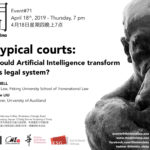 SPEAKERS Ray CAMPBELL, Professor of Law, Peking University School of Transnational Law Benjamin LIU, Senior Lecturer, University of Auckland ABSTRACT Artificial Intelligence has the power to redefine the way we live. The growing use of AI technologies in entertainment, education, transportation and healthcare is set to have…
SPEAKERS Ray CAMPBELL, Professor of Law, Peking University School of Transnational Law Benjamin LIU, Senior Lecturer, University of Auckland ABSTRACT Artificial Intelligence has the power to redefine the way we live. The growing use of AI technologies in entertainment, education, transportation and healthcare is set to have…
Read more...




